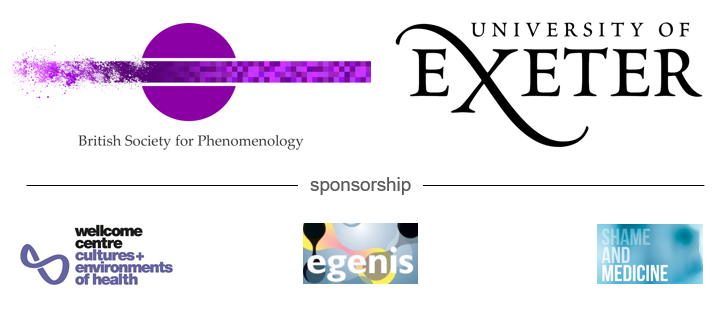
Location: University of Exeter, UK, in-person and virtual (hybrid)
Date: Tuesday 30 August – Thursday 1 September 2022
Go to the BSP2022AC website for registration information and more
‘Engaged Phenomenology II: Explorations of Embodiment, Emotions and Sociality’ builds upon the themes and contributions of our 2020 online conference ‘Engaged Phenomenology’, and is an invitation for phenomenologists and practitioners to critically reflect on how lived experiences regarding embodiment, emotions and sociality are incorporated into their work. It encourages people working through phenomenological approaches to more explicitly consider the socio-political realities and power relations which inevitably frame experience – whether writing from first-hand experience, citing case studies, undertaking qualitative research, or engaging with communities. Taking stock in this way raises questions of methodology and ethics, of course, but can also more radically point towards the transformative potential within phenomenology to address and democratise the conditions of possibility for both theory and praxis. Complementing applied and critical phenomenology, engaged phenomenology appeals across disciplines and beyond the academy. Its focus on relational lived realities speaks to a variety of contexts (e.g., healthcare, medicine, education, design, art, performance, psychology, architecture, community spaces, etc.).
We propose that ‘Engaged Phenomenology’:
> heeds the situatedness of lived experiences across diverse cultural and environmental lifeworlds
> invites us to hold this notion of plural lifeworlds together with wider phenomenological questions about lived possibility, power relations, and the condition of having and being in a lifeworld which feels open to us and to which we are open
> challenges assumptions around narrativity and privileged articulacy in phenomenological methods, embracing new ways of listening and attending to people’s lived experiences in their specificity and relationality
is mindful of how experience is lived through constellations of relations with others, rather than only seeking individualised (depoliticised) first-hand accounts
> considers the transformative potential of research participants sharing their experiences in meaningful ways, rather than merely assessing their ‘utility’ in academic terms.
The theme of the BSP 2022 Annual Conference is by Jessie Stanier, Wellcome Centre for Cultures and Environments of Health at the University of Exeter.
Keynote speakers:
> Prof. Alia Al-Saji, associate professor of philosophy, McGill University, Montreal, Quebec, Canada.
> Prof. Giovanna Colombetti, professor of philosophy, University of Exeter, UK.
> Dr Ullrich Haase, principal lecturer in philosophy, Manchester Metropolitan University, UK.
The conference also has two special panels from the Shame and Medicine research project: ‘Phenomenology and Shame Experiences’ and the Imagining Technologies for Disability Futures (itDf) research project: ‘Phenomenology, Disability, and Technology’.
Check out selection communications, with information on format and registration
Check out original submission metrics communications
Call for Papers (closed end of March 2022)
If you have any questions about the conference, please email: [email protected].

